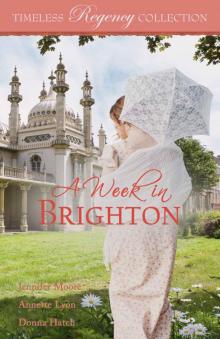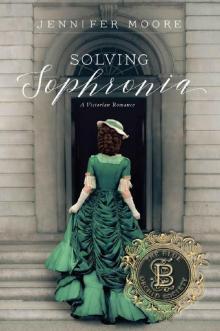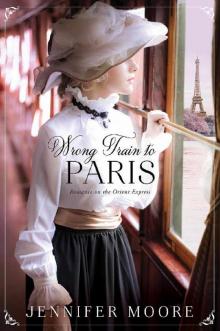- Home
- Jennifer Moore
A Week in Brighton (Timeless Regency Collection Book 13) Page 3
A Week in Brighton (Timeless Regency Collection Book 13) Read online
Page 3
She raised her chin and shrugged. “This business is still mine for four days. I will run it as I see fit.”
“They were just doing their job.”
Miss Dayley’s gaze shifted to the side. “I did not want them disturbing my customers.” The challenge in her voice lessened a bit.
“I don’t see any—”
Her eyes flashed, but their anger seemed to fade. “If you are not here to purchase baked goods, then I’ll ask you to leave. I am very busy.”
Arthur glanced past her to a glass-domed cake stand. “Are those éclairs?”
Miss Dayley kept her gaze fixed steadily on him. “Yes.”
“They look delicious.” He stepped past her, looking closer at the pastries.
Miss Dayley walked behind the counter and lifted the lid.
“And the usual price?” Arthur asked. “Double for the owner?”
She put an éclair into a paper sack and handed it to him. “You may just take it.”
Every bit of defiance was gone, and she looked exhausted—defeated.
“Miss Dayley.” Arthur spoke seriously. “All of this—these business dealings . . . None of it is personal.”
“When it affects a person, it is personal. And what you are doing affects a lot of persons.”
Hearing the despair in her quiet voice caused a twinge of discomfort. She was partially right. But there was more to the story. And he needed her to understand. “But it does not affect every person negatively. The hotel will be a benefit to Brighton. It provides jobs and—”
“Not for Jim Garrick. You dismissed him today.” She folded her arms, scowling. “He has a wife and two children. Will you tell them it is not personal?”
“I did not dismiss him, Miss Dayley. Mr. Simper did. And he did so because Mr. Garrick refused to follow safety procedures.”
Miss Dayley glanced to the side. “I did not know the whole of it. But I do worry for his children.”
Arthur leaned his forearms on the counter. “If I convince Mr. Simper to give Mr. Garrick a second chance, would that make you happy?”
“I don’t think that is something you could ever do,” she said.
“One conversation is all—” he began, as if he’d not understood her meaning.
She shook her head. “That is not what I meant, and you know it.”
Arthur pretended to look startled. “Are you issuing me a challenge, miss? Questioning my ability to make you happy? Because you must know, when I put my mind to something, I do not fail.”
“I am doing no such thing. I am simply telling you that you are the last person who would ever . . .” She shook her head. “You are the most . . . infuriating man I have ever met. You have the audacity to flirt with me—you.” She jabbed her finger toward him. “The same man who sent me an eviction notice less than a year after my mother died. This place”—she swept an arm around—“I grew up here. Made hot cross buns with my grandmother, learned to take orders and give change—this bakery is nothing but a plot of land to you, Mr. Grande, a chance to make money. But to me, to me, it . . . this is my heart.”
Her outburst left her red-faced and trembling. A heaviness settled into Arthur’s chest. “I did not do this to hurt you.”
“Well, you did.” She crossed her arms, deliberately not looking at him, and he suspected she was holding back tears.
“For that, I am sorry, Miss Dayley. I—”
The bell over the door rang, and they both turned to see Mr. Miller enter. He unrolled the schematic paper onto a table and looked around the room, his gaze coming to rest on the west wall of the bakery. “The problem’s easy enough to fix, Mr. Grande.” He took the pencil from behind his ear and made a note on the paper, then walked to the center of the room. “If we shift the entrance to the gentlemen’s smoking lounge just two feet this way”—he moved his arms as if physically pulling the entrance to the side—“there will be enough room for the extra piping behind this wall here.”
“You’re making my grandmother’s bakery into a smoking lounge?”
Her voice held no anger, only disbelief. Arthur carefully slid the rolling pin to the far side of the counter, out of her reach.
“Indeed, miss,” Mr. Miller said. “With a tobacco bar and standing ashtrays. It will be quite popular with the gentlemen, I assure you.”
Miss Dayley’s jaw went tight, and her eyes narrowed. “Get out.”
Arthur recognized the warning in her voice and snatched up his éclair before she could take it away. “Farewell, Miss Dayley.” He hurried across the room, grabbing the paper from the table and turning the architect toward the exit. “Come along, Mr. Miller. Let us discuss this outside.”
He lifted his hat from the hook, crammed it on his head, and practically shoved the man through the door, pulling it closed and feeling a wave of relief as though he’d escaped certain death by rolling pin. Not daring to even give a backward glance, he hurried Mr. Miller away from the bakery and back to the makeshift table to look over the plans.
The interaction with Miss Dayley had not gone at all how he wanted. Especially the end, when he’d feared for his life—but he still felt encouraged. He’d seen a crack in her battlements, and he knew that beneath the anger and hurt was the woman he’d met at the beach. Arthur had a plan, a purpose. He could make this woman happy. Fix the hurt he’d caused. And he hadn’t exaggerated his claim. In this, he did not intend to fail.
After Sunday’s church service, Daphne followed the congregation outside, but instead of continuing along to where people gathered on the grassy slopes near the road, she went around the side of the building. She walked the familiar paths through the gravestones until she came to the marker with her mother’s name carved on its smooth face.
Margaret Bellingham Dayley
1766–1813
“Mother, what am I to do now?” she whispered, running her fingers over the words.
But just as it had each time over the past six months, the grave remained silent. And what did she expect? A ghost to appear and give her advice? A letter to fall from the heavens telling her exactly which way to turn? Either would be nice, she thought.
Daphne was exhausted, and though she would not admit it aloud, she was frightened. Following her parents’ wishes had been easy enough. Go to school. Work at the bakery. But now, the direction she was to take was her choice alone, and she was terrified. What if I fail?
She rolled her eyes at that thought. She’d already failed. She hadn’t completed her education; she hadn’t kept the bakery running. How was she expected to develop a new plan when she couldn’t manage to keep afloat the things that had been planned for her?
She walked slowly toward the road, considering her options, but she had very few. Mr. Cawston of Cawston’s Baked Goods had offered to purchase her ovens and kitchen equipment. He’d even agreed to employ Ruth and Mary, which was an enormous relief. The money from the sale would be enough to live on for a while . . . but what then? Should she purchase property for a new bakery? Go to Cornwall to care for her cousin’s children? Join a gypsy caravan and read palms?
She gave a frustrated sigh.
“Daphne!”
Hearing the voice, she turned to see Sarah Taylor coming toward her, pushing a pram.
She waved at her friend and walked in her direction, meeting her at the road. “I’ve yet to see this little one,” Daphne said. She peered into the pram and smiled at the sleeping baby. “He is beautiful,” she whispered, touching the small fist.
Sarah beamed at the infant. “He is at that.” She groaned. “But lud, I’m tired. If only Little Ronald would sleep so well at night.”
Daphne chuckled.
Sarah turned the pram, and the pair walked toward the crowd of parishioners who gathered to visit in the churchyard. “Thank you for the bread and muffins, Daphne. Such a treat. I’ll miss Our Dayley Bread.”
“You’re very welcome.”
“What will you do now? Mr. Cawston mentioned you might come to work fo
r him.”
“I haven’t decided yet,” Daphne said. “But I suppose I must make a decision. And soon.”
“Perhaps the bakery closing is a blessing,” Sarah said. “Now you have the opportunity to do whatever you please.”
A feeling of panic made Daphne’s breath come fast, and she pushed it away quickly before it overcame her. “You’re quite right.” She forced a smile.
Seeing a feathered hat moving through the crowd toward her, Daphne glanced around for an escape. Before she could hide, Mrs. Libby, the vicar’s wife, emerged from the gathering and made a beeline toward Daphne.
“Daphne Dayley, there you are.” Mrs. Libby’s short, round figure and her love of ruffles, ribbons, and pastel colors always reminded Daphne of an elaborately frosted cake. She took Daphne’s arm. “How do you do, Mrs. Taylor? I hope you don’t mind if I steal away your companion. There is someone I am simply dying to introduce Daphne to.”
“Then you must do so immediately.” Sarah’s lips twitched as she tried to maintain a straight face. “It was nice visiting with you, Daphne.”
As Mrs. Libby pulled her away, Daphne turned so only Sarah could see her horrified expression. “Traitor,” she mouthed.
Sarah smiled cheerily and wiggled her fingers in a wave. And Daphne resigned herself to her fate. Mrs. Libby was ever trying to play matchmaker, and lately she’d set her sights squarely on Daphne. Much to Daphne’s dismay.
The vicar’s wife led her through the crowd to where Mr. Libby was speaking with a small group of gentlemen.
The vicar was tall and very slender with a long hooked nose. Daphne could not imagine a stranger-looking couple than the Libbys existed anywhere. He smiled when his wife arrived with Daphne. “There she is now.” He patted the man beside him on the shoulder and motioned to the ladies.
Daphne froze. The man with the vicar was Arthur Grande. Oh heavens, no. Was fate playing a cruel joke on her?
“Mr. Arthur Grande, allow me to introduce Daphne Dayley. Isn’t she lovely?”
Mr. Grande gave an overly bright smile. “Extremely.” He lifted his hat and gave a deep bow. “How do you do, Miss Dayley?”
Daphne opened her mouth to explain that she was already acquainted with the man and that he was in fact the very person ruining her life, but seeing Mrs. Libby’s hopeful smile, she could not do it. “A pleasure, sir.”
“Mr. Grande is the newest member of the parish choir,” the vicar said. “And he donated a very tidy sum to the building of new pews—we shall need them in the summer with all of the out-of-towners crowded into our small church.”
Mrs. Libby nudged Daphne with her elbow. “He has also agreed to attend the Bible study on Wednesday nights.”
Perhaps the town should throw Mr. Grande a parade.
“Has he?” Daphne said. She put on an exaggerated smile of her own and opened her eyes innocently wide. “I imagine Mr. Grande plans to volunteer at the orphan school as well?”
Mr. Grande watched Daphne with an infuriatingly amused expression.
“And assist the Ladies’ Auxiliary League with their annual picnic tomorrow?” Daphne added, her brow ticking.
Mrs. Libby pressed a hand to her bosom. “Oh, Mr. Grande, you really are a godsend to our town,” she gushed. “Isn’t he, Daphne?”
“What did we ever do without him?” she asked, shaking her head as if Mr. Grande’s presence in Brighton was more than she could have ever hoped for.
Another of the gathered gentlemen, Mr. Brambles, the haberdasher, cleared his throat. “So tell me, how did you get into the hotel business, Mr. Grande?”
Mr. Grande winked at Daphne, turning toward Mr. Brambles. “It is a rather dull story, sir.”
“I think we should all like to hear it,” Mrs. Libby piped up. “Shouldn’t we, Daphne?”
“I should like nothing more,” Daphne said.
His lips pulled in a small smirk that disappeared as he turned back to Mr. Brambles. “My father and uncle worked in the hotel business,” he said. “As . . . investors of a sort, purchasing lodging houses or inns that were in financial hardship. They would make repairs or update the décor—whatever it took to add value to the property—and sell.” He glanced around at the group—perhaps judging whether he still had their attention.
“My uncle died, and when my father became ill, he asked what I wished to do with the company’s funds. Would I continue with the same business? Or use the inheritance for a new venture?
“I wanted to make something amazing, instead of just passable. A hotel that was beautiful and grand.” He smiled at the appreciative chuckles at the pun on his name. “And together we came up with the idea for The Grande Hotel by the Sea.”
He looked in the direction of the hotel, though of course he couldn’t see it through the town. “The project took years of preparation and planning. My solicitor, Mr. Fawcett, and I moved to London. We invested and researched and finally found the perfect town, and later just the right location. And my dream is finally becoming a reality.” He spread his hands.
The group applauded.
“A wonderful story,” Mr. Brambles said.
Mrs. Libby wiped her eyes. She clasped his hand. “And we are so very happy to have you here, Mr. Grande.”
Daphne had heard enough. She pulled away her arm from Mrs. Libby’s, ready to make an exit.
But the vicar’s wife looped her arm back through Daphne’s elbow. “Miss Dayley used to live in London as well—for school. Didn’t you, dear?”
“Yes, I did.”
Miss Libby still had a hold on Mr. Grande’s hand. She tugged it to ensure she had his full attention. “Her father insisted Daphne needed an education, you see. A pity she had to leave it all and return home to manage the bakery when her mother died.”
Mr. Grande studied Daphne.
Mrs. Libby held her arm tighter as if she were hugging it. “But we are so happy you did, aren’t we, gentlemen?”
The other men agreed that they were very pleased Daphne had returned without finishing her schooling. What did a woman need schooling for anyway, and Daphne was much more suited to baking.
Daphne pulled at her arm again, anxious to leave.
Mrs. Libby held on tight. “And what will you do now that the bakery is closing, dear? Will you move Our Dayley Bread to a new location?”
“You could work as a cook in a manor house or a restaurant,” Mr. Bramble offered helpfully.
“Or bake for Mr. Cawston,” the vicar suggested.
Daphne gave her arm a strong pull, breaking free from Mrs. Libby’s grip. “Thank you all for your suggestions. Please do excuse me.” She gave a curtsey and turned before anyone could protest, nearly running down the road in her haste to escape.
Footsteps sounded behind her, and Daphne looked up to find Mr. Grande had joined her.
“Shall I walk you home?” He offered his arm.
She ignored the gesture and quickened her pace, nearly to a trot. “I’m not going home.”
“Where are you going?” He walked faster, his longer strides keeping up with her.
She glared at him. “Don’t you have a ladies’ society meeting to attend or a lost kitten to rescue?”
He laughed. “Of course. But that is all scheduled for later this afternoon. Right now, I should like to see you safely to . . . wherever you are going.”
“That is not necessary.” Daphne was getting winded, and her breathing was becoming labored. Seeing that he was not planning to relent, she slowed. If he wished to walk beside a person determined to ignore him, well, that was his problem.
“I didn’t know you lived in London,” Mr. Grande said conversationally.
“Perhaps I forgot to mention it when I told you the entirety of my life story,” she said.
“You did leave out quite a few key elements.”
His walking stick tapped on the paving stones as they strolled. “And now, what? Do you intend to return to London? Will you open another bakery? Work for Mr. Cawston?”
/> “Why the sudden interest in my welfare?” Daphne asked.
“It is not sudden at all,” he said. “I take a great deal of interest. For example, what if my hat should fly away again? Or what if the workers become unruly and I need a person who knows how to wield a firm rolling pin? In either case, I should like to know where to find you.”
Daphne opened her mouth, but the witty retort didn’t come. “I don’t know,” she said quietly.
He looked toward her. “You really have no plans? Or just none you wish to tell me?” Disbelief chased all humor from his voice.
Daphne kept her eyes on the road ahead. “Both.”
The pair walked in silence, coming to the end of the road and turning to walk along the beach.
Daphne let the sound of the waves soothe her strained nerves. If there was one thing she could count on it was the steadiness of the sea. If only her future were so predictable.
She glanced to the side. Mr. Grande seemed completely content to walk beside her without any idea of their destination. She tried to rally the anger she’d felt toward him but found it had weakened, and that left her feeling exposed.
“Your father seems to have been very supportive. An admirable trait.”
“He was that,” Mr. Grande agreed. “I only wish he could have lived to see . . .” He motioned up the beach toward the hotel site.
“He would have been proud,” Daphne said, then felt instantly embarrassed. Did she just compliment him?
Mr. Grande looked at her for a moment, then turned his gaze back to the sea. “Miss Dayley, I am very envious of you.”
She blinked, stopping and turning fully toward him. “You are . . . envious? Of me?”
He nodded, motioning at the town with a sweep of his arm. “You have what I always wished for. A community. A town. A place you belong.” He sighed. “The first place I ever lived for more than a few months was Eton. Many of the boys there knew each other; some had grown up together. Their families were established in their communities . . . They spoke about neighbors and distant relatives and long-standing holiday traditions . . . and I envied it more than I can say.”

 Charlotte's Promise
Charlotte's Promise Miss Leslie's Secret
Miss Leslie's Secret My Dearest Enemy
My Dearest Enemy A Week in Brighton (Timeless Regency Collection Book 13)
A Week in Brighton (Timeless Regency Collection Book 13) Solving Sophronia (The Blue Orchid Society, #1)
Solving Sophronia (The Blue Orchid Society, #1) Spring in Hyde Park
Spring in Hyde Park Emmeline
Emmeline Wrong Train to Paris (Romance on the Orient Express, #2)
Wrong Train to Paris (Romance on the Orient Express, #2) Wrong Train to Paris
Wrong Train to Paris Miss Burton Unmasks a Prince
Miss Burton Unmasks a Prince Safe Harbor
Safe Harbor The Sheik's Ruby
The Sheik's Ruby Change of Heart
Change of Heart Lady Helen Finds Her Song
Lady Helen Finds Her Song Simply Anna
Simply Anna